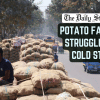Market regulation at its worst

The abnormal surge in green chilli prices in recent days has once again exposed the failure of market regulators to keep prices of essentials stable and protect the interests of ordinary consumers. On Saturday, retail prices of green chilli jumped to an unprecedented Tk 700 per kg – a steep increase from just Tk 100 to Tk 120 per kg a month ago – while wholesalers at Karwan Bazar sold it for Tk 500 per kg. This marked the culmination of a rapid price escalation centred around the Eid holiday, when chilli is usually in high demand, in a trend that exploits temporary disruptions in food supply to inflate prices.
Although retail prices of chilli fell by Tk 200 to Tk 250 per kg on Sunday, thanks to reports of the impending arrival of imported chilli, the damage has already been done. The spike in chilli prices has caused significant distress to consumers already struggling with a massive cost-of-living crisis. We are told that a further decline in chilli prices is expected within a few days. We must ask, however, why the situation has been allowed to deteriorate to the point that it did. True, weather-induced crop damage is largely to blame for the dearth of supply and resultant price increases, but it was nothing unpredictable. It could be, and should have been, offset with timely imports and stern measures against price manipulators. That the authorities still failed to intervene points to their lack of sincerity.
This is totally unacceptable. We have, unfortunately, seen such scenarios in the past as well. We have seen how the absence of effective oversight mechanisms and proactive measures to address supply shortages left consumers at the mercy of unscrupulous market players. The inability to predict and address such situations is a fundamental flaw in our market regulatory system, which should aim to protect consumers from being exploited. We urge the authorities to acknowledge this failure, and take immediate steps to rectify it. Without proactive measures, consumers will continue to be victims of such contingencies.


 For all latest news, follow The Daily Star's Google News channel.
For all latest news, follow The Daily Star's Google News channel. 









Comments